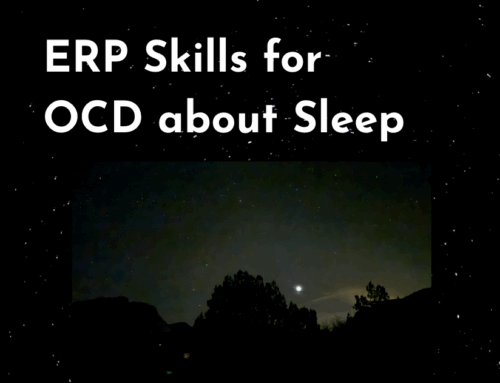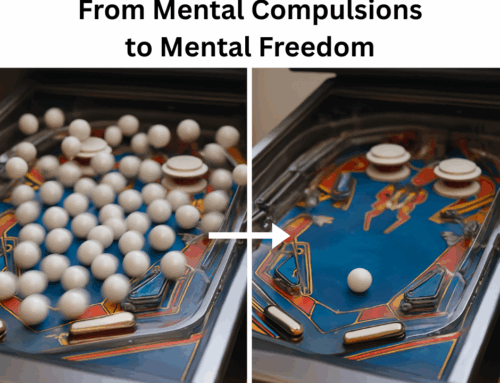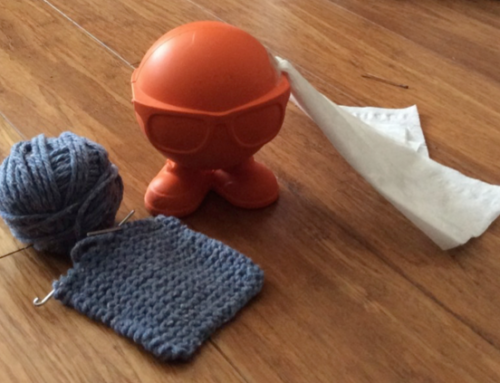 Key Takeaways
Key Takeaways
- OCD isn’t about being neat or quirky. It’s about fear, doubt, and the search for certainty.
- Intrusive thoughts feel real, but recovery means learning to treat them as irrelevant.
- Exposure and Response Prevention (ERP) is the gold standard therapy for OCD.
- Loved ones can help by asking how to provide support, not by reassuring.
- Recovery rebuilds freedom, connection, and hope for everyone involved.

For those of us living with OCD, sometimes the hardest part isn’t the scary thoughts or the anxiety they create, but the misunderstanding that surrounds the disorder. When people hear “OCD,” they often think “organized” or “perfectionist.” But the reality is far more painful and complex. OCD isn’t about cleanliness or being tidy; it’s about fear, doubt, and the desperate attempts to find certainty in an uncertain world.
This post is for the family members, partners, and friends who want to understand what OCD really feels like, how it affects connection, what recovery looks like, and how their support can make all the difference.
How OCD feels from the inside
OCD is a brain disorder that makes us feel as if we’re being mentally tortured. Our own minds threaten us, warning us of danger that doesn’t exist but seems terrifyingly real. When I had untreated OCD, I often felt like it was holding me hostage at gunpoint:
“Then I felt it. Not just the tears, which had started to fall in earnest. But the barrel of a gun, pressing gently into my temple. ‘I’ve had it with you,’ my OCD sneered… Once again, [OCD’s] Rule #1 flashed in front of my eyes.”
Is Fred in the Refrigerator? Taming OCD and Reclaiming My Life, p. 125
The disorder threatens consequences if we don’t follow its rules and “do something” to make the anxiety go away: for instance, check, ruminate, avoid, or confess. Even though we often know the fear doesn’t make sense, the emotion is so overpowering that it can feel impossible to resist.
What OCD does to connection
When the brain is locked in survival mode, connection becomes difficult. OCD can make us retreat inward, caught in endless rituals that crowd out everything else, including the people we love most. As I shared in my memoir:
“What a shame OCD is ruining my life. OCD makes you afraid to love anyone or anything, because the worry that accompanies love is more a punishment than the love is a reward. I feel so alone and scared and hopeless.” (Fred, p. 124)
That’s one of the most heartbreaking parts of OCD: it isolates us from the relationships and support that could help us heal. For loved ones, it can be confusing and painful to watch. You might wonder why we seem distant or preoccupied, why we ask for reassurance over and over, or why we avoid certain situations. None of that means we don’t care. It means OCD has convinced us that safety comes before connection.
But here’s the hopeful truth: connection can return when we start to see OCD for what it is and learn how to respond differently.
The OCD recovery journey
 Recovery from OCD isn’t about controlling every thought. It’s instead about reclaiming your life from fear. The gold standard therapy for OCD is Exposure and Response Prevention (ERP), a powerful approach that helps us stop treating intrusive thoughts as meaningful. ERP teaches us to treat those distressing “what if” thoughts as irrelevant, and over time, that’s exactly what they become.
Recovery from OCD isn’t about controlling every thought. It’s instead about reclaiming your life from fear. The gold standard therapy for OCD is Exposure and Response Prevention (ERP), a powerful approach that helps us stop treating intrusive thoughts as meaningful. ERP teaches us to treat those distressing “what if” thoughts as irrelevant, and over time, that’s exactly what they become.
Through practice, ERP helps us make new choices. Instead of doing compulsions to feel “safe,” we learn to face anxiety and move forward with what’s important to us. After lots of ERP practice, OCD’s threats lose their credibility, and what once felt impossible becomes doable, and sometimes, even fun.
As Reid Wilson, PhD, writes in the Afterword to Fred:
“Can you tame OCD? Bet your life on it. That’s why Shala wrote this book.” (p. 269)
The belief that we can get better is at the heart of recovery. With the right help, we can stop letting OCD dictate our choices and start writing our own stories again. Recovery means learning to step back into the driver’s seat of life, shoulders back, eyes forward, and living fully, courageously, and joyfully.
How loved ones can help
Support from loved ones can be one of the most powerful forces for recovery. But helpful support looks different from what you might expect. OCD recovery is most effective when everyone, including the person experiencing OCD, their therapist, and their support network, works as a team.
One of the most important steps you can take is to ask your loved one how you can best support them. You can even ask to attend a therapy session with them to learn about OCD and how the therapist recommends you participate in the process. ERP works best when everyone understands the same framework.
Sometimes, when loved ones try to help without being invited into the process, their efforts (though well-intentioned) can accidentally make things harder. For example, giving reassurance might momentarily soothe anxiety but can strengthen OCD’s grip. When you’re included in therapy, you’ll learn what truly helps: encouragement to face fear, patience with the process, and compassion without rescuing.
Examples of providing support
Here are a few examples of how you might provide support to your loved one with OCD.
- Validate their emotional experience and courage. When your loved one expresses fear or doubt, resist the urge to comfort by trying to “fix” the worry. Instead, you might gently say something like, “I know this feels really hard, but I believe in you. What would your therapist encourage you to do right now?”
- Encourage ERP and ongoing therapy. Celebrate courage over comfort, progress over perfection.
- Be patient with the process. Every time your loved one resists a compulsion, they’re building strength.
- Stay compassionate, not corrective. Your supportive, nonjudgmental presence is often one of the most healing things you can offer.
If you’d like more guidance on supporting a loved one with OCD, I highly recommend the book When a Family Member Has OCD by Jon Hershfield, MFT. It’s a wonderful resource for learning how to partner in the recovery process effectively and compassionately.
When loved ones learn about OCD, participate in therapy when invited, and support recovery with patience and understanding, connection grows stronger than the disorder. Together, you can build a shared language of courage: one based not on fear, but on trust and hope.
Learn more about helping your loved ones tame OCD
To learn more about what it feels like to have OCD, how it can impact loved ones, and how to fight back, see is Is Fred in the Refrigerator? Taming OCD and Reclaiming My Life. Click here to purchase your copy.
Sign up for my Shoulders Back! newsletter to receive OCD-taming tips & resources, including notifications of new FredTalks, delivered every month to your inbox.
My blogs are not a replacement for therapy, and I encourage all readers who have obsessive compulsive disorder to find a competent ERP therapist. See the IOCDF treatment provider database for a provider near you. And never give up hope, because you can tame OCD and reclaim your life!







Leave A Comment